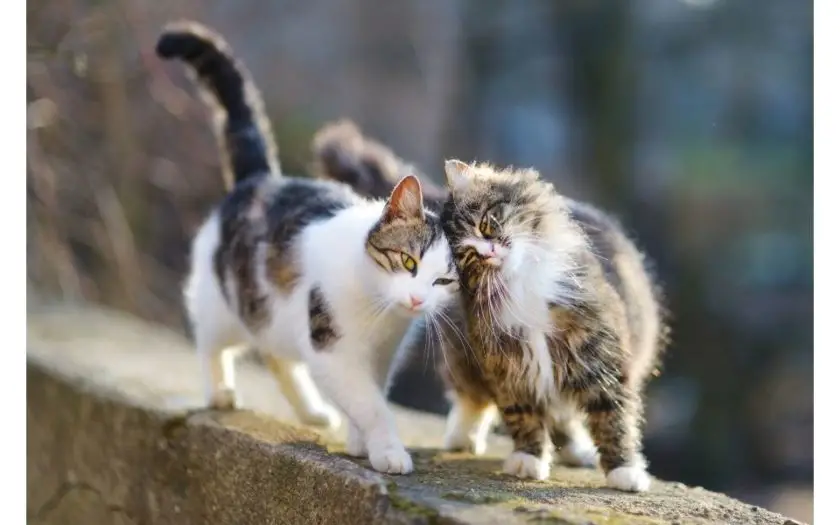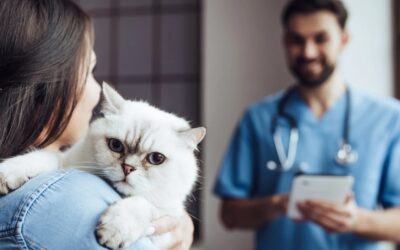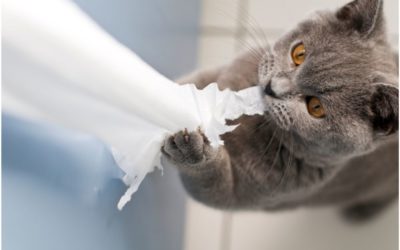Darwin said that the only purpose of sex is to reproduce. Due to our high intelligence, humans have developed a range of complex emotions, including love. This means we no longer view sex as a purely primal instinct.
What about the animal kingdom? Are two male cats displaying a homosexual preference when they are mounting each other? Or is there something else going on? Read on to find out, you know you want to… 😉
The scoop:
Across the animal kingdom, many species (including cats) engage in homosexual acts. The reasons behind these behaviors are hard to work out. However, scientists currently believe that homosexuality among animals is either caused by an innate need or the result of frustration, rather than a sexual preference.
Why would a cat be homosexual?
In 2012, research found that homosexuality in animals is much more common than we previously thought. In fact, homosexual behavior has been observed in over 1,500 species, from insects to mammals [1]. Lions have even been known to form male-only groups that repeatedly engage in homosexual behaviors. Male feral cats have also been known to mount each other[2].
So, what is going on?
Homosexuality doesn’t seem to make much sense when you think about it. Why would a male cat try to mate with another male if it can’t reproduce? Scientists have come up with a range of possible reasons for this behavior. So let’s dive into them now:
Social bonding
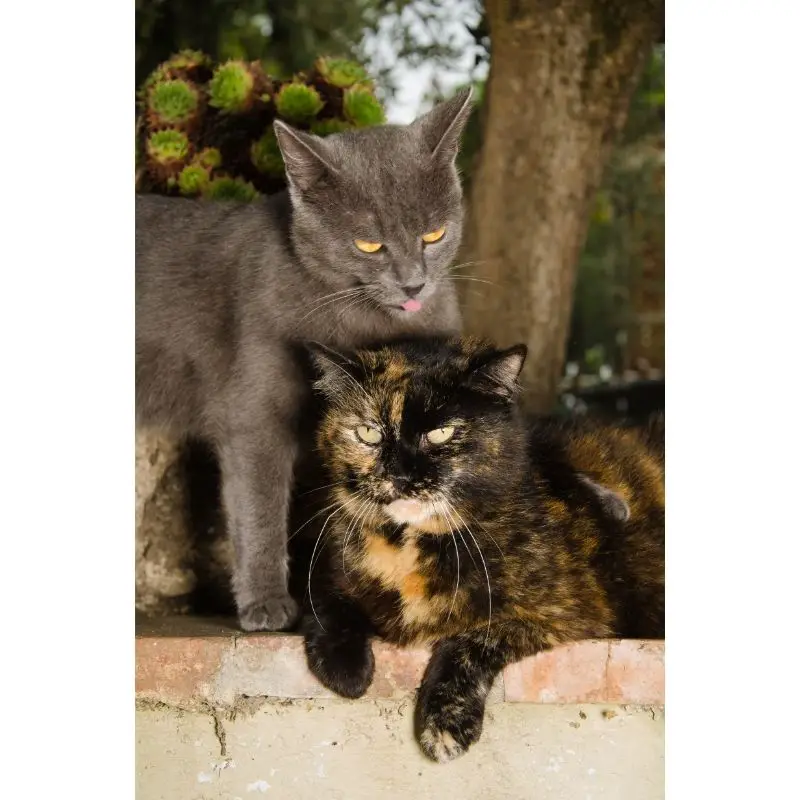
Intelligent animals like felines may participate in same-sex mating to reinforce social bonds. The reasons behind this can range from the availability of food resources (who doesn’t consider a bit of flirting to get that last slice of cake…), to defense tactics and mating purposes [2].
Feral cats are known to form loose hierarchies, with individuals often coming and going as they please. Domestic cats have had to learn how to live in close quarters with each other. So could homosexual behavior simply be a way of reinforcing friendships and keeping the peace?
Practice
A simple explanation for same-sex pairing in cats is practice! Kittens, in particular, have been known to mount anything in sight! Especially if they have been raised alone. So, could this be an innate instinct to ‘get ready’ for the actual act?
Neutering
Research has shown that neutering is effective at decreasing male-typical behaviors (such as aggression and spraying) in 90% of cases [3]. A females’ pheromones will also decrease after she has been spayed. However, sex is a primal instinct right? So does the urge ever fully go away? While it is true that neutering is very beneficial at decreasing unwanted behaviors (and too many kittens!), the lack of a strong female pheromone may actually be causing some confusion! This can lead to sexual aggression between both males and females.
Sexual frustration
In May 1999, a study was conducted on a feral cat colony in Ainoshima, Japan, to assess male-male mounting behavior [2]. The study concluded that it only occurred during the estrus season (when females were in heat). This would suggest the behavior is the result of sexual frustration. Especially when you consider that it often happened just after a female shunned her male suitor and left the area.
So, if your domestic cat smells a female in estrus outside your home, he may well take his frustration out on another cat, person, or object in the house!
Dominance
Displays of dominant behavior in cats are fairly common, especially in males. In feral and domestic cats, males have been known to display dominance by forcing another cat to assume the female mating position [4]. This is more likely to happen in a stressful or unfamiliar environment. Alternatively, resident cats may try to dominate a newcomer in their home. So, you must introduce new pets slowly to reduce stress and potential aggression.
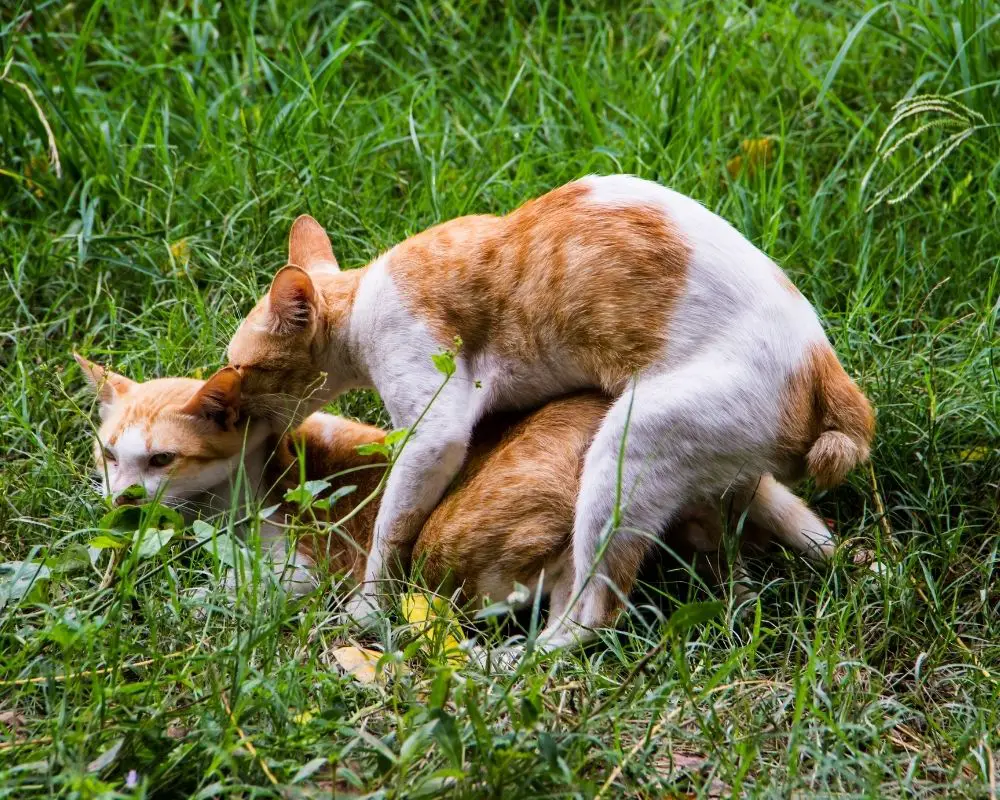
So, could my cat be gay?
Clearly, scientists have come up with a range of alternative reasons for homosexual behavior in cats. But does this mean we can rule out the possibility of homosexuality? The problem is, the ‘acts’ are easy to observe but the motivation behind them is harder to decipher. Cats can’t tell us if they have loving feelings towards one another!
In order to be gay, cats need to show a strong preference for other cats of the same sex. You may have witnessed your cats snuggling up and licking each other with apparent affection. But how do we distinguish between a friendship, a sexual preference, or even love?
Current research has theorized that animals, including cats, lack the full range of sexual emotions that humans experience. Based on this evidence, cats can’t be gay as it is not a conscious lifestyle choice. So, could we be misinterpreting the signs based on our own views?
Can homosexuality in cats be misinterpreted?
Here’s another problem. Unlike humans, cats are believed to act on instinct rather than thinking everything through! Cats COULD be ‘attracted’ to other cats of the same sex but they could also simply be acting out of frustration, aggression, or an innate ‘need’.
Human sexuality is complex. We have a range of sexual emotions from lust to love. Cats on the other hand, are not considered to be highly social. They also do not form life-long commitments as far as we are aware.
Wild cats generally have large territories. However, we often confine domestic cats to smaller territories. As a result, they have had to develop friendships that are more intense than the ones observed in the wild. The fact that our domestic felines are capable of adapting in this way, suggests they are more socially complex than we realized.
So can cats be homosexual? We cannot rule it out. But so far, it seems as though the possibility is a little far-fetched!

